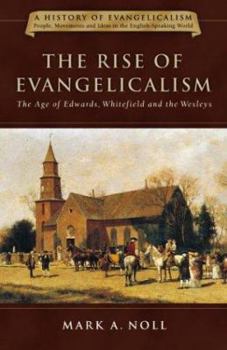The Rise of Evangelicalism: The Age of Edwards, Whitefield and the Wesleys
(Book #1 in the A History of Evangelicalism Series)
Select Format
Select Condition 
Book Overview
Winner of a Christianity Today Book AwardThe word evangelical is widely used and widely misunderstood.Where did evangelicals come from?What motivated them?How did their influence become so widespread... This description may be from another edition of this product.
Format:Hardcover
Language:English
ISBN:0830825819
ISBN13:9780830825813
Release Date:January 2004
Publisher:IVP Academic
Length:330 Pages
Weight:1.20 lbs.
Dimensions:1.2" x 6.3" x 9.2"
Customer Reviews
4 ratings
A Great History of Evangelicaliam
Published by Thriftbooks.com User , 16 years ago
Noll does a great job of listing the history of how Evangelicalism came about. The men that he writes about are interesting themselves and Noll has perked my interests to read some biography's on men like Edwards, and the Wesley's. This book also does a great job of keeeping you interested in the reading. I highly recomend this book to anyone intereted in finding out where Evangelicalism as a whole came from.
Mark Noll's Most Engaging Book
Published by Thriftbooks.com User , 17 years ago
I've always admired Mark Noll as one of the foremost historians in the evangelical community. His scholarship is balanced, his judgments are nuanced, and his work is meticulous. What he hasn't been in the past is interesting and fun to read. That has changed with this compelling first volume in a five volume series on evangelical history. Mark discusses the three antecedents of American and British evangelicalism: Pietism, Calvinism, and high church Anglicanism. He highlights influential works by Cotton mather and Jacob Spener, and he depicts the spiritual lethargic landscape in the days prior to the Northampton revival of 1734. He then discusses the powerful ministries of Jonathan Edwards, George Whitefield, and John and Charles Wesley. He shows how evangelicalism was shaped by what God did through their preaching and writing. He underscores epochal sermons by Edwards on justification, and Whitefield's inspiring extemporaneous sermons that took the colonies by storm. This is a fast reading book which holds your attention from the very first page. I had a hard time wading through some of Mark Noll's other books (America's God was tough reading, History of Christianity in the US and Canada was somewhat tough as well, but this one is right up there with Doug Sweeney's American Evangelical Movement. Thumbs up!!!
A Scholarly, but Readable History
Published by Thriftbooks.com User , 18 years ago
This work is the first in a projected 5 volume series on the history of evangelicalism. It explains the origins of the movement in a confluence of English, Continental pietist, and American Puritan influences in the first half of the eighteenth century, and follows the movement through 1795. Due to the involvement of evangelicals in politics in recent years, there is a great deal of interest by those outside the movement in coming to a better understanding of who evangelicals are. This book would make a good start. Hopefully, the forthcoming volumes will further the story as effectively as this one.
You will be glad you read it
Published by Thriftbooks.com User , 18 years ago
I am a scientist with an interest in church history, not a professional historian. But in my limited view, this is an important book. Covering the period of 1740 to 1795, it is the first of a five volume series edited by Noll on the history of evangelicalism. It appears to be a scholarly treatment of a topic of which I knew relatively little. I knew something about Edwards, Whitefield, and the Wesleys but, if nothing else, this book was worth reading to learn the striking story of William McCulloch, "a somewhat colourless parish minister" in the village of Cambuslang, just outside Glasgow. Despite John Wesley's view that Scots were a people that "hear much, know everything, and feel nothing", MuCulloch appears to have been a dedicated pastor who loved his parishioners and they reciprocated by responding to his preaching. At communion time in 1742 a reawakening broke out in this village that changed the course of the Scottish Kirk. I wish I had known William McCulloch. I am struck by Noll's description of how this movement, refusing to be constrained by socioeconomic barriers, spread to every stratum of society, including the slaves of the Caribbean and North America. Noll's distinction of how this resulted in Abolition in England while having a different result in the United States is thought provoking and distressing. There is an excellent index that allows one to return to the historical details that one rapidly forgets. But the most striking portion of this book is the last chapter. One of the important topics Noll treats here is the role of hymnody in this movement. Noll shows how central the place of singing was to this movement and how those hymns that were most enduring and which were embraced by people across the theological spectrum differed from the large body of hymns of the period. One of the most attractive stories is how John Wesley and Augustus Toplady tried to do theological battle by writing polemical hymn texts. But the people of both their respective camps enthusiastically adopted the warring hymns of both authors and today we join them in singing "Rock of Ages" and "O for a thousand tongues." Then there is the Introduction and the Afterword, but I will never tell the punch line! Buy your own copy of this very reasonably priced book. It will be a satisfying read and you will undoubtedly return to it many times. I impatiently await the second volume.




